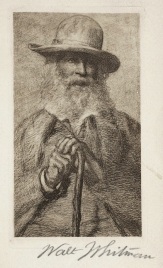Walt Whitman’s American Bible
Happy Birthday, Walter! Walt Whitman’s Leaves of Grass is deeply indebted to the King James Bible, despite Whitman’s claims to be utterly original. In fact, Whitman wrote of his work as “the Great Construction of a New Bible.” The first, slim, volume of Leaves of Grass was published in 1855. Whitman paid for it himself, and there were fewer than 800 copies. The rest of Whitman’s poetic life was spent revising and adding to this collection, culminating in the final “Deathbed” edition of 1891. The original 95 pages had swollen to almost 450, and the 12 poems of the 1855 edition had become nearly 400.
Various explanations have been offered for Whitman’s title, “Leaves of Grass,” including the obvious pun on the “leaves” of a book. But somewhere in the background is probably the statement of Isaiah that “All flesh is grass, and all the goodliness thereof is as the flower of the field: The grass withereth, the flower fadeth: because the spirit of the LORD bloweth upon it: surely the people is grass” (Isaiah 40:6-7). Isaiah’s grim prophecy of death is transformed by Whitman into a celebration of the natural cycle, in which death is part of life and the poet, like all the people he sings of in his poem, returns to the earth from which he came. As Whitman writes in “Song of Myself,” “I bequeath myself to the dirt to grow from the grass I love,/ If you want me again look for me under your boot-soles.”
“Song of Myself,” the first poem in the 1855 edition, may also derive its title from the Bible. The great Old Testament celebration of love is the Song of Songs or Song of Solomon, an erotic dialogue between a man and a woman rich in metaphors of spices, fruits, animals, and birds. Whatever the original author intended, Jews and Christians have both traditionally interpreted the poem as an allegory for the love between God and humanity. Whitman’s “Song,” typically and radically, is not of God, or even a lover, but of himself: “I celebrate myself, and sing myself.”
One striking feature of Whitman’s poetry is his rambling but rhetorically powerful prose-poetic line, often full of lists of people, places, and things. He adapts this line, just as William Blake did before him (and Alan Ginsberg after), from the parallelistic prose of Isaiah and other Old Testament prophets, in the King James Version. Leaves of Grass may be a new American Bible, but in some ways it sounds a lot like the old one.
Hannibal Hamlin, associate professor of English at The Ohio State University, was co-curator of the Manifold Greatness exhibition at the Folger Shakespeare Library.
Note: You can read (or hear) about the Whitman engraving shown here on the web page Personalizing Shakespeare, by Louis B. Thalheimer Head of Reference Georgianna Ziegler.







In whitmans “a song of the rolling earth” he follows exactly the structure and phraseology of 1 Corinthians 13. Check it out!
October 15, 2013 at 9:51 am